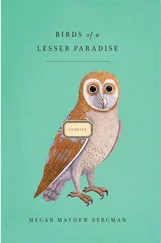HER MOTHER HAD WARNED HER: You aren’t suited to the kitchen — you’re too anxious: you’ll go mad from the isolation, the repetition. Can you stand to make croissants every day? What if you poison someone? Lose a walnut shell and someone chokes to death?
To placate her mother, she enrolled in college — the same school her mother had attended — in a hilly, gorge-cut town. She spent all her time in Risley Hall, drowsing over Dickens, Brontë, Eliot, Woolf, the decrepit sunlight coming into the late-afternoon glass. Half attending to the lectures of her professors. Like the wonderful old Russian who spoke about Victorian novels and their “primitive coloration,” who set her imagination off in other directions for weeks. It seemed as if the life of the mind precluded the life of the body: poets were ascetic, hollowed-out by thinking; her professors seemed almost deliberately ugly — especially the women. Though her mother couldn’t help the lovely black drift of her own hair and eyes, she restricted herself to the bitterest little cups of coffee and lived on the biscotti Avis made for her — bone dry, barely enough sugar to matter.
Brian was her tutor. He’d taken her on after three other grad students at the study center had given up. He stuck with Avis, going over oligopolies and externalities, and never said, “But it’s so simple …” like the others.
He had a satisfying wholeness about him, American good looks like a baseball player’s — level shoulders, a pale shock of hair. A good mind and ethical nature: little gave him more pleasure than learning laws and governance—“It shows you the shape of your society.” But what drew the deepest sliver of her self toward him, toward love, was the weakness in his chin, his slightly disoriented air, like an injury he allowed only Avis to see. Brian was the opposite of her mother. There wasn’t a whiff of mystery about him: he was solid, entirely himself. Avis still cooked in those days and she invited him to her minuscule studio. She set a hibachi up on the fire escape and grilled him a marbled, crimson rib eye, crusty with salt and pepper, its interior brilliant with juices. Some garlicky green beans with pine nuts, rich red wine, mushrooms and onions sautéed in a nut-brown butter. She’d intuited his indifference to chocolate, so dessert was a velvety vanilla bean cake with a toasted almond frosting. It was a dark art: she knew what she was doing every step of the way, but she wanted him. She wanted children with him. By the end of the meal, he sat half sprawled beside her on the couch, crushing the hem of her skirt. He pulled her down on top of him, wouldn’t let her clear away the dishes: she heard his pulse through the thick wool of his sweater. He loved her, he’d said, his breath redolent of vanilla and almond. He loved her one hundred percent.
She’d smiled — guiltily conscious of having unbalanced him. “But do you love me 105 percent? How about 173 percent?”
He’d turned red and said, “Yes.” Then added politely, “Though those percentages aren’t possible.”
She told him then she hated school. She took him to the Moosewood Café, the Morritz Bakery, she showed him the way they folded cranberries into their Vacherin . She made him seven-layered strawberry pavé cakes. When she confessed, with a deep blush, her wish to attend the culinary institute, he encouraged her to apply. Told her there were loans and scholarships, that he would help her research these things. Excited and anxious, she felt an unraveling in herself, the disconnected threads reaching toward Brian.
THERE IS, IN THE BACK of Avis’s mind, the thought that now she’ll need to hire a new assistant. But for some reason she isn’t in a rush to do so. Delivery trucks rumble to and from the front step every day — two are refrigerated vans which pick up her pastries to ferry throughout the city — the others arrive with specialty items for her baking: lilac honey, a fine-milled pastry flour, a gelatin from Provence. The sound of an assistant speaking Spanish with a delivery driver limned the edges of her day. As she piped rosettes, docked a sheet of dough, or doused a tart with sanding sugar, another world occurred on the doorstep. Now Avis answers the door herself and leads surprised delivery people into the front entrance, across the living room, and through the heavy swinging door to her kitchen. She almost enjoys the contact with the outside world. On Monday, there is a Colombian man who delivers free-range eggs and unpasteurized milk that glows like satin. Tuesdays, a woman from Lima bring special concoctions of candied lilacs and fruit peels and gelées, and later a young boy comes with a box filled with dried starfruit and bananas and fresh tea, mint, and sage from his father’s botanical garden in the Redlands. She asks and forgets everyone’s names, but next week, she thinks, she’ll ask again. Some deliveries — like those from her son’s market — come every week, others — like the fig balsamic vinegar — were special-ordered to accompany a single chocolate strawberry ice cream cake.
On Wednesday, Avis stands at the window, peering through the latticework of leaves and spines at the neighbor pinning up her washing. The doorbell chimes startle her. She drapes a towel over a rising brioche dough, feeling newly capable, a tick of expectation as she goes to answer. When she opens the door, at first all she sees through the screen is a glint in someone’s hand. Pushing open the screen door, she realizes it’s Eduardo, one of Stanley’s delivery people, holding Avis’s antique silver tray. “This was propped against your front door.”
When she’d left the tray at the neighbor’s feet the other day it was etched with tarnish all along the swirls and the central silver coin. Now it gleams. Avis marvels, turning it over. Someone has polished every crevice, rubbed at every impossible edge and crook; not a speck on it. Eduardo carries his cooler into the kitchen, stacks tubs of strawberry purée in the freezer. There are almonds for her macarons, vanilla pods, raw cocoa. She follows him in, props the tray against the wall, staring at the gleam. After he finishes unloading, Eduardo stands, about to lift the cooler, then stops in place, looking out the back window. “Is she Haitian?”
Avis turns. Their backyard is framed in the wide window above the sink. “I don’t actually know.” She can see the woman shaking out a wet pink skirt. “We haven’t really talked.”
“Did you notice those?” He gestures up.
Avis is momentarily dazed by the bleached sky: a hawk of some sort floats by, wings glinting and flat. Something twinkles at the near corner of the neighbor’s yard, nearly hidden among the branches. “What is that?” Avis puts on her kitchen readers. She sees it now: small creatures fashioned out of straw and grass — a mouse and two small birds, swaying, suspended by invisible strings.
Eduardo stands beside her at the sink. He smells slightly sour, like physical labor. “Voodoo,” he says. “They’re some kind of little offerings.”
“Really? Voodoo?” She lifts the stem of her glasses. Once, while delivering some cakes with Carlita, another assistant, Avis spotted a dark knob of some sort in the street. She stared, unable to identify it until she was nearly standing over it: a dog’s paw, cleanly severed mid-leg. Carlita had grabbed her and pulled her away, muttering a Hail Mary under her breath.
“It’s just another religion,” he says dismissively, and turns back to study the kitchen. “So cool here. This place reminds me of Hansel and Gretel.”
Avis continues to stare at the bouncing straw mouse. “I wouldn’t let a gumdrop or candy cane within twenty feet of my kitchen.”
“Well, you’re not that kind of witch.” Eduardo squats over the cooler, stuffing plastic bags back into it and slapping the top shut again. He backs out of the kitchen holding his cooler; at the front, he opens the screen door with his shoulder. “According to Stan, you’re the real deal,” he says, starting down the front steps. “A real sugar artist.”
Читать дальше












